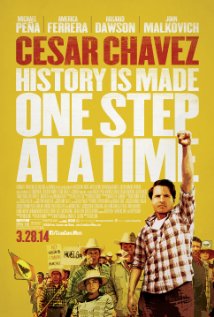César Chávez (film)
| César Chávez | |
|---|---|

Film poster
|
|
| Directed by | Diego Luna |
| Produced by |
Emilio Azcárraga Jean Lianne Halfon John Malkovich Gael Garcia Bernal Russell Smith Diego Luna Larry Meli Keir Pearson Pablo Cruz |
| Written by | Keir Pearson |
| Starring |
Michael Peña America Ferrera Rosario Dawson John Malkovich |
| Music by | Michael Brook |
| Cinematography | Enrique Chediak |
| Edited by |
Douglas Crise Miguel Schverdfinger |
|
Production
company |
|
| Distributed by |
Pantelion Films Participant Media |
|
Release date
|
|
|
Running time
|
102 minutes |
| Country | Mexico United States |
| Language |
English Spanish |
| Budget | $10 million |
| Box office | $6.7 million |
English
César Chávez is a 2014 American biographical film produced and directed by Diego Luna about the life of American labor leader César Chávez, who cofounded the United Farm Workers. The film stars Michael Peña as Chávez. John Malkovich co-stars as the owner of a large industrial grape farm who leads the opposition to Chávez's organizing efforts. It premiered in the Berlinale Special Galas section of the 64th Berlin International Film Festival.
The film follows César Chávez's efforts to organize 50,000 farm workers in California. Some of them were braceros—temporary workers from Mexico permitted to live and work in the United States in agriculture, and required to return to Mexico if they stopped working. Working conditions are very poor for the braceros, who also suffer from racism and brutality at the hands of the employers and local Californians.
To help the workers, César Chávez (Michael Peña) forms a labor union known as the United Farm Workers (UFW). Chávez's efforts are opposed, sometimes violently, by the owners of the large industrial farms where the braceros work. The film touches on several major nonviolent campaigns by the UFW: the Delano grape strike, the Salad Bowl strike, and the 1975 Modesto march.
Although numerous books, magazine articles, and scholarly studies have been written about César Chávez, Chávez is the first feature film about the labor leader. Keir Pearson, who wrote the Academy Award-nominated screenplay for the 2004 film Hotel Rwanda, wrote Chávez. Many writers and producers had tried for years to obtain the rights to Chávez's life story, but failed. Pearson negotiated for two years with Chavez's heirs before he and production partner, television producer Larry Meli, were able to secure the rights to Chávez's life in 2011. Pearson says his script focuses on the positive aspects of Chávez's personality, family life, and public accomplishments, but it is not a whitewash. Pearson and the producers reviewed the script with the Chávez family. Many of the comments made by the family, as well as anecdotes told by them, made it into the script. Pearson also relied heavily on archival material held by the César Chávez Foundation. The script focuses primarily on the grape boycotts and strikes of the 1960s and early 1970s.
...
Wikipedia
